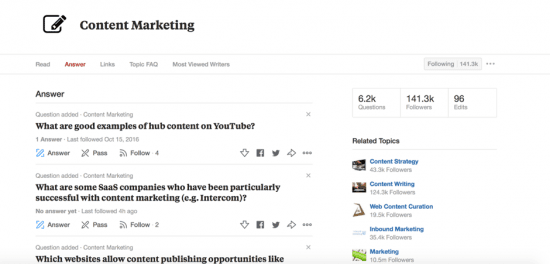Quora can be an incredibly valuable content marketing tool
In fact, Quora can help with multiple common content marketing goals, such as getting more traffic or boosting your industry authority – plus, it’s an extremely tool for research. But, more on that in a bit. In this blog post, I’m going to show you how to use Quora as part of your content marketing strategy.
What is Quora and why should you be bothered?
Quora is, as they put it, “a place to share knowledge and better understand the world”. In other words, it’s a place where anyone can ask and answer questions about pretty much any topic you can think of.
People use Quora to ask for advice for their personal and professional lives, to get recommendations for products and services, to ask for strangers’ opinions on different subjects (both personal and professional), and much more.
And, of course, people also use Quora to respond to questions – and that’s where you can get involved too.
For any question asked, anyone can answer, and there can be as many answers as there are people who want to answer them. The best and most popular answers for any question – the ones that get the most upvotes – move up along the answer feed so that they appear nearer to the top.
Quora is also very similar to social networks; users can follow other people, as well as topics and specific questions that interest them and see new questions and answers in their main feed. They can also interact with others by leaving comments on answers, upvoting answers and requesting specific people to answer a certain question.

So, why should you add Quora to your content marketing strategy?
- Boost your industry authority/social influence: Quora is the perfect place to demonstrate your expertise on any subject. By answering questions and being honest and truly helpful, you are effectively showcasing your knowledge of your niche, time and time again
- Get more traffic: Quora is also a great place to promote your website, blog, and content. You can do so on your profile bio, as well as in your answers, where relevant

- Improve lead generation and conversions: when you consistently provide real value in your answers, people will want to know more and visit your website or blog, sign up for your list, follow you on social media, and so on
- Reach more people: Quora is a very popular platform and can help you reach a whole new audience (especially if one of your answers gets sent in a Quora email digest – that can generate a huge boost in views)
- Deal with customers directly: people might also be using Quora to ask about your products and services. Make sure to be there to help answer any questions, whether positive or negative, as soon as possible. For example:

- Learn about your audience: another very good use Quora is for market research. Because it’s a platform where people ask questions, you’ll be able to find out what needs and interests your audience has and use that to improve your own content marketing strategy.
- It’s evergreen content – sometimes, when I look up something up on Google, I’ll get Quora question answers from years before – and in some cases, they’re still relevant. The answers you give aren’t just relevant for a day or 2 (depending, of course, on the topics you talk about) but can still be relevant (and easy to find) even months and years later
Getting started with Quora
The first step is to create and optimise your profile:
- Add a profile image
- Link to your website
- Write a description
- Write your bio credentials (this can be seen any time you post something, next to your name):

- Add educational credentials
- Add “knows about” topics:

Then, start getting involved.
The easiest way to get started is to find some relevant topics and subscribe to them. Use the search bar to look up your keywords and click on “Topics” on the left-hand side of your screen:

Look for topics with active members and who have lots of followers – this way, you can answer questions posted in that topic and the followers will be able to see your answer in the feeds.

Once you find a topic, you can also get suggestions of related topics to join, which makes your job much easier.
You can also use the search bar to look up just questions – just use your keywords and click on “questions” in the search results page, like you did with “topics”.
How to choose the right questions to answer
Some questions are better than others – that is, if you want to grow your profile and get as many views as possible.
Ideally, some of the best questions to answer are very recent ones. If you can be the first or at least among the first few who answers, you’re increasing your chances of getting more views and upvotes.
However, you can also get amazing results from older questions that already have quite a few answers.
Once you find a question that you’re thinking of answering, check its stats first:

This question has a lot of public followers (129), which means it has pretty big reach. Not to mention, it’s also generated in excess of 60k views – which suggests there is interest in the topic.
The ‘last asked’ date is also quite important. Ideally, you should answer questions that were asked again recently.
How to answer questions
There are several aspects that make a good response:
- Remember that you’re answering a real person’s question, not writing a blog post. That means you too should respond like a person, not a brand or a marketer. Be personable and let your personality shine
- You need to actually answer the question; the more time you spend on Quora reading answers, the more you notice people who don’t actually answer a question but rather find a close enough angle that helps promote something. That’s not a good strategy – Quora works when you provide value and actually answer the question.
So to sum up, you need to be friendly and casual in your response, answer the actual question, and strive to provide real value.
How to boost your content marketing results with Quora
As you can see above, Quora can help you achieve numerous content marketing goals: getting more traffic, improving lead generation and conversions, and with gaining more social influence/boosting your authority.
So, how exactly does it help?
Boosting your authority and social influence
In order to become a well-known influencer and thought-leader in your niche, Quora might not be enough to get you there, but it can be of huge help. You should be active on your blog and/or social media as well, together with Quora:
- Post new answers consistently and often: in order to get people to notice you and your expertise, you should strive to respond to questions at least on a weekly basis (but ideally, more often than that)
- Always provide value: if someone asks how to do something, share quality tips and advice based on experience. The more honest you are, the better
- Show yourself off: in order to stand out, strive to showcase your personality in your answers. Influencers often develop an online personality that helps people relate to them more easily and that helps them differentiate themselves from others
Driving traffic and boosting lead generation
One of the things I love most about Quora is that it not only helps drive more traffic to your website, blog, or other resources, but in my experience, it’s also very high quality traffic; traffic with a low bounce rate, that visits several pages in one session, and that signs up for email lists.
In order to achieve this, you need to provide real value in your answers and only link to your content where completely relevant and helpful to the person asking the question. Excessive linking will probably get your account suspended, and not to mention, people can usually tell when you’re just promoting and not actually helping.
So, in order to drive traffic and leads from Quora, you should only link to your content where relevant and also link to other useful resources from other top publications.
But most importantly, you need to use your answer as an ad to your link: by providing value in your answer and helping people with it, you’re increasing your chances of getting traffic back.
Think of it this way; if you have a question and look it up on Quora and find an answers that tells you everything you wanted to know (or enough to get the ball rolling), you’ll be much more likely to trust that person and want to see how else they can help. Otherwise, if you see an answer saying something like “you’ll get all your answers here” + a link or two, you’re rightly going to assume that person is not only clearly promoting something but not even giving you any reason why you should visit that link.
And, unfortunately, there are quite a few of these types answers – thankfully, not enough to make people stop using Quora though.
Conclusion
Have you tried using Quora yet? If not, it’s definitely not too late. Quora can bring a lot of benefits to the table and can be a valuable business and content marketing tool even if you don’t actively use it to ask and answer questions (particularly for content and market research).
However, if you do decide to try out Quora and be an active member of the community, it can bring about some great results – stick with it, experiment with different types of questions and answers, and always provide value.























